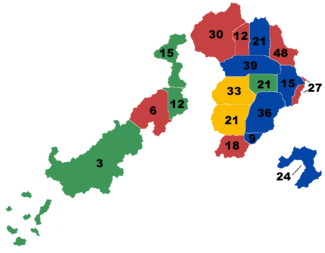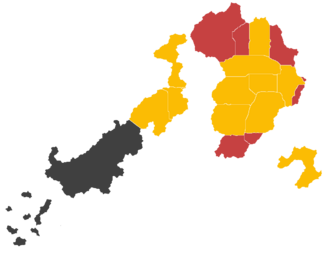2001 Tevitheimer Grand Chancellery Election: Difference between revisions
No edit summary |
No edit summary |
||
| Line 76: | Line 76: | ||
| after_party = [[Liberal Democratic Party of Tevitheim|Liberal Democratic]] | | after_party = [[Liberal Democratic Party of Tevitheim|Liberal Democratic]] | ||
}} | }} | ||
The '''2001 Tevitheimer grand chancellery election''' was the seventh sextennial grand chancellery election in [[Tevitheim]]. Unlike previous Tevitheimer elections, which usually consisted of two primary candidates, the 2001 election had four contenders for the grand chancellery; Jarl of [[Brendanland]] [[Aaron Edwards]] of the [[Tevitheimer Social Union|Social Union]], Vice Chancellor [[Joakim Sunde]] of the [[Republican Party of Tevitheim|Republican Party]], law professor [[Paal Zhang]] of the newly founded [[Liberal Democratic Party of Tevitheim|Liberal Democratic Party]], and independent businessman from [[Ditka]] [[Vernik Hjertsson]]. Because none of the candidates for grand chancellor garnered a majority of electoral votes, the [[Alnating of the United Jarldoms|Alnating]] was entitled to select the grand chancellor (with each jarldom casting one vote). After 36 ballots of deadlock, Hjertsson and Edwards threw their support behind Zhang, who was elected grand chancellor. | |||
Edwards won most of the interior and south of Tevitheim and split New Trondheim with Sunde, who also won the northern jarldoms. Hjertsson won several western jarldoms, and Zhang was popular in the jarldoms with high amounts of Chinese voters. Edwards won a plurality of the electoral vote while Sunde won a plurality of the popular vote. Zhang came in third place for electoral votes and fourth in the popular vote while Hjertsson won third in popular vote but fourth in electoral vote. Thus, Hjertsson was eliminated from the contingent election, though some members of the Alnating from jarldoms which voted for Hjertsson were able to keep their jarldoms from casting votes for Edwards. After 36 ballots Edwards and Hjertsson asked their supporters to vote for Zhang, who was elected on the 37th ballot. | |||
This is one of only two elections to be decided by the Alnating, the other being the [[1959 Tevitheimer Grand Chancellery Election]]. Due to the controversy of this election, the contingency process was eliminated in 2005 in favor of a two-round system. Zhang's 19.77% represents the lowest ever percentage won by someone who was elected grand chancellor (though Raimundo won 8.97% in [[2007 Tevitheimer Grand Chancellery Election|2007]], she ascended to the grand chancellery due to the resignation of both officials before her in the line of succession). Zhang's election marks the only time a member of a party that was neither the Social Union or Republican parties won the grand chancellery in a popular vote without being the incumbent grand chancellor. | |||
Revision as of 03:50, 18 September 2024
| |||||||||||||||||||||||||||||||||||||||||||||||||||||||||||||||||||||
390 members of the Electoral Council 196 votes needed to win | |||||||||||||||||||||||||||||||||||||||||||||||||||||||||||||||||||||
|---|---|---|---|---|---|---|---|---|---|---|---|---|---|---|---|---|---|---|---|---|---|---|---|---|---|---|---|---|---|---|---|---|---|---|---|---|---|---|---|---|---|---|---|---|---|---|---|---|---|---|---|---|---|---|---|---|---|---|---|---|---|---|---|---|---|---|---|---|---|
| Registered | 122,406,049 ( | ||||||||||||||||||||||||||||||||||||||||||||||||||||||||||||||||||||
| Turnout | 98,578,018 (80.5%) ( | ||||||||||||||||||||||||||||||||||||||||||||||||||||||||||||||||||||
| |||||||||||||||||||||||||||||||||||||||||||||||||||||||||||||||||||||
Map of jarldoms by first-place winner: Dark blue indicates jarldoms won by Edwards/Andersen. Red indicates jarldoms won by Sunde/Duraksen. Orange indicates jarldoms won by Zhang/Nordby. Green indicates jarldoms won by Hjertsson/Ceder.
| |||||||||||||||||||||||||||||||||||||||||||||||||||||||||||||||||||||
| |||||||||||||||||||||||||||||||||||||||||||||||||||||||||||||||||||||
The 2001 Tevitheimer grand chancellery election was the seventh sextennial grand chancellery election in Tevitheim. Unlike previous Tevitheimer elections, which usually consisted of two primary candidates, the 2001 election had four contenders for the grand chancellery; Jarl of Brendanland Aaron Edwards of the Social Union, Vice Chancellor Joakim Sunde of the Republican Party, law professor Paal Zhang of the newly founded Liberal Democratic Party, and independent businessman from Ditka Vernik Hjertsson. Because none of the candidates for grand chancellor garnered a majority of electoral votes, the Alnating was entitled to select the grand chancellor (with each jarldom casting one vote). After 36 ballots of deadlock, Hjertsson and Edwards threw their support behind Zhang, who was elected grand chancellor.
Edwards won most of the interior and south of Tevitheim and split New Trondheim with Sunde, who also won the northern jarldoms. Hjertsson won several western jarldoms, and Zhang was popular in the jarldoms with high amounts of Chinese voters. Edwards won a plurality of the electoral vote while Sunde won a plurality of the popular vote. Zhang came in third place for electoral votes and fourth in the popular vote while Hjertsson won third in popular vote but fourth in electoral vote. Thus, Hjertsson was eliminated from the contingent election, though some members of the Alnating from jarldoms which voted for Hjertsson were able to keep their jarldoms from casting votes for Edwards. After 36 ballots Edwards and Hjertsson asked their supporters to vote for Zhang, who was elected on the 37th ballot.
This is one of only two elections to be decided by the Alnating, the other being the 1959 Tevitheimer Grand Chancellery Election. Due to the controversy of this election, the contingency process was eliminated in 2005 in favor of a two-round system. Zhang's 19.77% represents the lowest ever percentage won by someone who was elected grand chancellor (though Raimundo won 8.97% in 2007, she ascended to the grand chancellery due to the resignation of both officials before her in the line of succession). Zhang's election marks the only time a member of a party that was neither the Social Union or Republican parties won the grand chancellery in a popular vote without being the incumbent grand chancellor.





